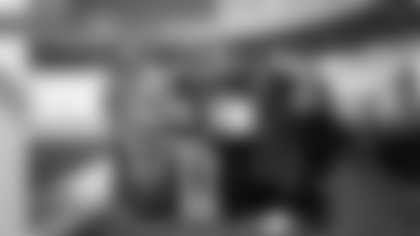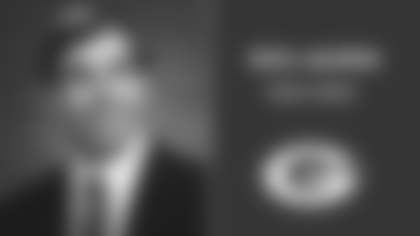A funny thing happened to Jim Ringo, the premier center in Packers history, on his way to the Pro Football Hall of Fame.
Simply put, he almost didn't make it.
In fact, what was to become his Hall of Fame career almost ended before it began.
The circumstances were these:
A New Jersey native who had been a three-year starter at Syracuse under the esteemed Ben Schwartzwalder, Ringo entered the National Football League draft in 1953 upon completing his collegiate career with the Orangemen and was selected by the Packers in the seventh round -- the 79th player chosen overall.
Ringo, however, did not find his subsequent introduction to professional football particularly enchanting -- or promising, for that matter. In fact, after assessing the competition at his position, he became fearful of his chances for survival.
And, accordingly, he walked out "a couple weeks into training camp," he said in telephone interview I had with him in 1981 -- at the time he was inducted into the Pro Football Hall of Fame.
"I left camp with Bob Kennedy, a high draft choice from the University of Wisconsin," he reported. "The Packers were training up in Grand Rapids, Minnesota, and we left camp and went to his father's cabin in the Rhinelander (Wis.) area. I went on home (to Phillipsburg, N.J.) from there.
"When I got home, I wasn't received in the best manner," Ringo remembered. "Not because of what I had done but because of the way I did it (walking out of camp). My father wasn't happy about it and neither was my wife."
Asked what had prompted him to make his "escape," Ringo replied, "That rookie year, I looked around and saw there were seven centers on the roster. I only weighed about 217 pounds and -- realizing they were only going to keep one center -- I figured my chances of making it were pretty slim.
"The length of the practices also was a factor. Going through all that suffering to make a football team was quite ridiculous ... I felt. The fact that we were training at the University of Minnesota School of Agriculture at Hibbing also was a factor The campus was located outside of town and we were isolated from everything.
"In order to get a haircut, you had to get the permission of the coach (Gene Ronzani) to catch the bus into town. I thought that was ridiculous ... I think it shows how far this game has come from those days."
Addressing his mindset at departure, Ringo said, "I just thought I would go home and become one of the multitude."
Fortunately for Ringo, and thousands of Packers fans, the team was not ready to close the books on their vagrant center and permit him to join "the multitude."
"Chuck Drulis, who is dead now, was an assistant coach with the Packers then," Ringo recalled, "and he was the one who got on the phone and called me. He talked me into coming back."
This, in itself, was something of a departure from standard operating procedure at that time, Ringo noted.
"When you left a club then, they weren't making too many calls to track you down because of the great numbers of players available. I guess Chuck was able to see that I had a future in pro football, even though I couldn't recognize it at the moment.
"Thank God they had more foresight," he said, "than I did."
Once he returned to the Packers, Ringo did a dramatic about-face, fully justifying Drulis's confidence in his potential. Developing into one of the premier downfield blockers and pass protectors in the league, as well as a strong team leader, he went on to win all-NFL honors six times -- five of them in succession. He also played in 10 Pro Bowls, the first seven as a Packer (in 1964, he was traded to the Philadelphia Eagles, with whom he spent the last four years of his 15-year playing career).
In the process, Ringo also proved to be one of the most durable performers in the game's history, playing a then-record 183 consecutive games (Ironically, it was former teammate Forrest Gregg who was to break the record three years after Ringo set it).
Actually, Ringo is better known for his eventual departure from Green Bay -- via that trade to Philadelphia and the circumstances surrounding it -- than he is for his temporary "disappearance" from training camp during his rookie season.
Legend has it that Ringo arrived in Green Bay in the spring of 1964 with an agent, when agents were just beginning to surface on the pro football scene. Head Coach/GM Vince Lombardi, the same story goes, was affronted, having been accustomed to dealing with players face to face as Green Bay's head coach and general manager.
After greeting Ringo and his agent in his then-City Stadium office, he allegedly excused himself, adjourned to a neighboring office, called the Eagles and executed the trade, then returned to his office to inform Ringo (and his agent) that, "You're talking to the wrong man ... you now belong to the Philadelphia Eagles."
In the lengthy interim, Ringo has both debunked the story and added fuel to the possibly fictitious fire.
In a 2002 interview, for example, he said, "I know it makes for good copy, but there was no agent. I promise you that."
Three years earlier, however, in another interview, he had declined to clarify what happened in that now distant transaction, one version of which suggests that the trade was prearranged by Lombardi and Ringo, who presumably wanted to be closer to his Pennsylvania home.
Asserting that only three people will ever know the truth (himself, his wife and Lombardi), Ringo said, "He (Lombardi) didn't say anything, so why should I say anything?
"I think it should be kept a mystery. Here it is, over 30 years later, and you're still asking questions about what happened. Name another trade in the National Football League that has carried on for over 30 years."
Jerry Kramer, who lined up at right guard alongside Ringo for the latter's last six seasons in Green Bay, injected another element to be mulled over in this connection.
"You have to remember, Lombardi didn't have another center at that time." Kramer said. "(Bob) Skoronski had to move over from tackle to center that season before Kenny Bowman moved in.
"I think it was an attempt to nip in the bud the thing about agents. I think (Lombardi) would have done it to me if I would have brought in an agent."
Whatever the case, Ringo still vividly remembers the euphoria of getting to the "mountaintop" in Green Bay -- winning back-to-back NFL championships in 1961-62.
"That experience was just incredible," said Ringo, the offensive captain of those titled teams. "To be a champion in a community that small was something else. No matter where you went, somebody knew you. You'd walk down the street and people would say 'Hi' and want to talk about the Packers."
Now 72 and living in Cheasapeake, Va., Ringo has remained a "lifetime" Packer.
"It's the good things, it's the Green Bay Packers, it's how wonderful Milwaukee is, how wonderful the state is," he has said. "I think that's what's so important ... not the things that happened the other way."
Continuing an association with the team that is more than 55 years old, Lee Remmel was named the first official Team Historian of the Green Bay Packers in February 2004. The former *Green Bay Press-Gazette reporter and Packers public relations director, Remmel will write regular columns for Packers.com as part of his new assignment.
In addition to those articles, Remmel will answer fan questions in a monthly Q&A column. To submit a question to Remmel or read his archive, click here. *














